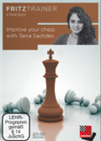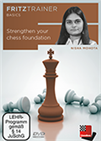Stereotype Threat, Debunked?
In my previous article, I asked Dr. Andrei Cimpian, an expert on gender stereotyping, about stereotype threat. Replying to my email follow-up with him on August 22, Dr. Cimpian wrote, “Stereotype threat is not debunked, but — as I mentioned in my interview (and as the comments suggest) — there's a lot of controversy around it.” According to Dr. Cimpian, the controversy is about whether stereotype threat results in performance decrements. However, whether or not performances change under stereotype threat, stereotype threat manifests in lowered feelings of belonging and safety.
Comeback likelihood?
In my first article on Jennifer Yu at the U.S. Junior championship, I cited sports research about a second-half comeback being unlikely if a team was way behind at half-time. When I heard Dr. Kenneth Regan speaking about poor performances in chess round robins, I contacted him via email. Dr. Regan stated, at about 20 minutes into this episode of The Perpetual Chess Podcast, “a player who starts poorly is identified as the ‘rabbit’ and people...play harder against that player.” I asked Dr. Regan if Jennifer Yu, due to her 0-5 start in the U.S. Junior Championship, might have been the “rabbit” in that field. Dr. Regan replied:
The results of my ‘screening test’ hint at what you surmise. Her accuracy was only the smallest notch or two below the expectation for her rating according to both Stockfish 10 and Komodo 12.3. Her opponents, however, notched among the highest.
Jennifer Yu responds
FM, WGM, and 2019 U.S. Women’s Chess Champion Jennifer Yu responded to my questions, via email.
 On this DVD, well-known Indian WGM Tania Sachdev shows you how to evaluate certain positions and then find the right concepts and plans on the basis of her own games.
On this DVD, well-known Indian WGM Tania Sachdev shows you how to evaluate certain positions and then find the right concepts and plans on the basis of her own games.Alexey Root: What do you think of “rabbits” in chess, as defined by Dr. Regan?

Jennifer Yu: It certainly makes sense for players to try their hardest against the players who aren’t in their best form or who are rated lower than the rest of the pack. I’ve played in the reverse situation against a “rabbit” before and I find myself being extremely careful because some players can become extremely dangerous once they have nothing to lose. It’s far from unheard of for a “rabbit” to take down a player on top of the standings and flip the tournament upside down. I was unaware my opponents were playing at a higher accuracy than their expected rating levels against me, and I think that’s a difficult thing to assess with everything going on in a chess game.
AR: As the wildcard for the U.S. Junior Championship, what were your expectations? Did you put a lot of pressure on yourself?
JY: If I have high expectations, I usually perform much worse. At my first U.S. Women’s Championship, I placed a lot of pressure on myself and it was a disaster. I ended with 2½/11 and last place. Going into the U.S. Junior Championship, I didn’t have very high expectations because I was second to last seed. I hoped for a great tournament of course, but realistically, I didn’t have very positive prospects. However, I also discovered that most of my best tournaments are ones where I didn’t expect much in (such as Charlotte IM Norm January 2018 and the 2018 Women’s Olympiad) which didn’t hold true for U.S. Junior Championship. After winning the U.S. Women’s Championship, I do feel more pressure at tournaments to perform well since more people would be paying attention than before. However, I don’t think that pressure played a significant role in my performance at the U.S. Junior Championship, because I played three back-to-back tournaments prior to it and kept my expectations low.
 IM Nisha Mohota shows guidelines to steer you through the opening, shows basic endgames, helps you to understand fundamental pawn structures, and explains principles and patterns of attack and defense
IM Nisha Mohota shows guidelines to steer you through the opening, shows basic endgames, helps you to understand fundamental pawn structures, and explains principles and patterns of attack and defense
Between rounds at the 2019 U.S. Junior Championship
AR: In this award-winning podcast episode of Ladies Knight, where you were interviewed by US Chess Women’s Program Director Jennifer Shahade, your advice to a girl who had a bad start in a tournament was: “Don’t get psyched out. Don’t give up. Don’t think about anything but the move you want to make.”
Were you able to follow your own advice at the U.S. Junior Championship?
JY: I think I did a great job at not letting consecutive losses mentally get to me during the U.S. Junior Championship. The difficulty of playing a round robin is that you don’t get a break and are guaranteed a tough opponent following a loss, unlike most opens where you would be paired against someone lower rated. I actually quite liked this, even though it seems strange because of my score, but I tried to approach each game like a new tournament and a good opportunity to play against a strong player. I didn’t give up at any point in the tournament and fought in every game, even if some were just opening disasters where I never really stood a chance of surviving (such as my games in round 2 and 4). Even though I ended up losing my game in round 8, I was proud of it because I thought the quality of my play was better than it had been in earlier rounds and I nearly drew an interesting endgame (unfortunately the key word is “nearly”).
AR: In that same Ladies Knight interview, you said that you “went to the gym every day during the U.S. Championship” Did you keep up that gym routine during the U.S. Junior Championship too?
JY: I’m a creature of habit, so I like keeping a pattern throughout tournaments. Whenever I go to St. Louis for a tournament, I always have the same routine, which during U.S. Junior Championship included going to the gym.
AR: One of the ChessBase comments on my first “Jennifer Yu” article was “women of high accomplishment in chess actually do play ‘worse’ than similar men — be it in mixed competition or segregated. This is neither ‘opinion’ nor sexist. Go through engine evaluations from various tournaments and you will see a larger amount of moves the engine considers a blunder among female players.”
Do you think this comment is true? Or do 2450-rated chess players play games at roughly the same level, whether they are men or women?
JY: I think that this definitely varies among individuals and not the wide category of men and women. If it comes across that women seem to make more [blunders], I believe that it has a lot to do with stylistic choices. From my experience, many female players are aggressive so naturally more engine swings would occur in sharp and unclear positions. However, this is a crude generalization because many good female players are solid positional players too. For me, I often make decisions that I realize may not be the best move, but might be practical in allowing my opponent to make a mistake — especially taking other factors like time into consideration — I actually made dubious decisions like this throughout U.S. Junior Championship, which I was punished for due to the fact that I was playing strong IMs and GMs.
I think it’s ludicrous to imply that men and women who have the same rating are at different strengths. Rating is a number that is meant to be blind to all factors except the result of a game. Moreover, the argument that women’s ratings could be inflated by playing only female tournaments is completely invalid since most women don’t only play sectionalized tournaments. Using me as an example, I played fourteen tournaments in 2018 but only three of them were women-only events. Eight months and eight tournaments into 2019, the only women’s tournament I played in is the U.S. Women’s Championship. Therefore if a man and a woman have the same rating and the woman seems to make more red moves, all I can say is that both have different individual strengths and weaknesses.

AR: What are your upcoming tournaments? Your plans for studying chess or getting a chess coach?
JY: I’m playing in a few more Opens before senior year starts and I’ll be swamped with college applications and homework. Hopefully, I’ll make good use of my few remaining weeks of summer and seriously study my chess. I plan on getting a coach sometime soon because I haven’t progressed much over the last few years.
AR: Anything else you would like to say to ChessBase readers and your fans via this article?
JY: I’d like to mention that I’ve always been an incredibly inconsistent player. If my worst tournaments and my best ones were put side by side and compared, it wouldn’t look like I was the same player. The quality of my play even fluctuates from one game to another. This can be seen in my most recent tournament, the Washington International, where I played one of my best games of recent months in round seven, and then one of my worst games I’ve probably ever played in round eight. It’s quite baffling that such a significant difference could occur between games one round apart. This has been an ongoing problem for years, so in all honesty, my disastrous result at U.S. Junior Championship was disappointing but it didn’t surprise me. I’ve had tournaments just as bad as this one before (almost every U.S. Girls’ Junior Championship is an example), the only discrepancy being that it’s never been so publicized before and I haven’t faced such strong opposition. My FIDE rating the last two years reflects this since it’s been shooting up and down drastically between the 2250-2380 range with the only periods of stability during months where I haven’t played any tournaments.
My situation in the hunt for the IM title also makes perfect sense, because I have all three of my norms but have yet to cross the 2400 threshold. To me, this means that I am capable of performing at IM-level strength in my best tournaments, making it possible to achieve the norms, but that I’m definitely a long road away from consistently playing at that level, making the rating much harder. I’m going to work on diminishing the impact of my worst tournaments and become a more stable player, but I’m going to have to put a lot of work in because there are a lot of weaknesses that I need to target.
All in all, there are no excuses to be made for my performance at U.S. Junior Championship. I didn’t go into the tournament with the correct strategy and should’ve realized early on that I needed to change the unnecessarily aggressive way I was playing if I wanted to stop the bleeding. My opponents out prepped and outplayed me and there’s no solution for that except to get better. I dug myself into a hole with issues that plagued me throughout the tournament like time management, and I’ll need to drastically correct them if I want to avoid situations like this in the future.
At the end of the day, U.S. Junior Championship was just a bad tournament. However, one bad tournament doesn’t seem too bad in the grand scheme of things if I’m able to learn from my mistakes.
Links
























